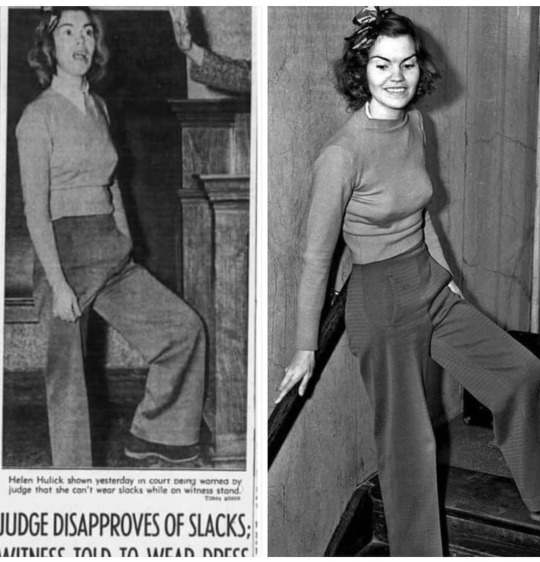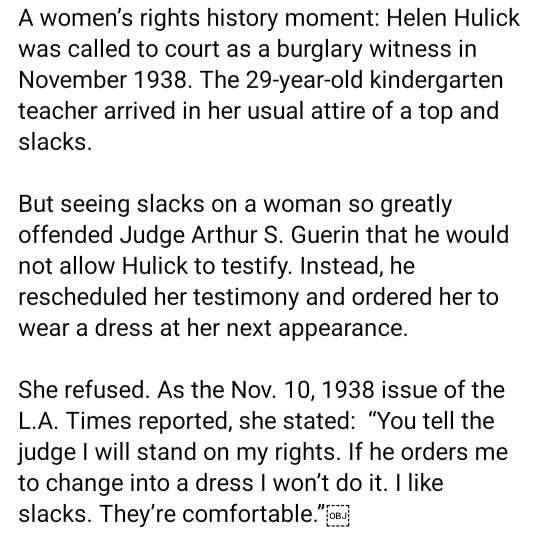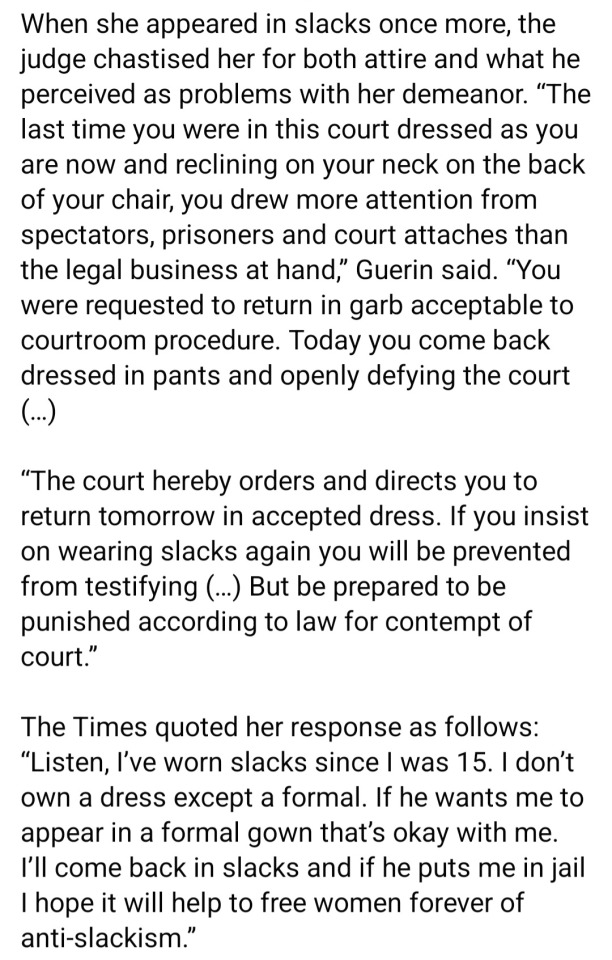#helen hulick
Text

“in 1938, LA kindergarten teacher Helen Hulick went to jail for wearing pants in a courtroom. she was a witness scheduled to testify against two men. when she arrived in slacks, her testimony was rescheduled; the judge ordered her to go home and return in a dress. she refused, noting inequality.”
1 note
·
View note
Text

#true crime of the day calendar#late post#judge#rights#womans rights#dress#slacks#pants#comfort#comfortwear#comfortable#comfy cosy#comfy and cute#jail#free#free women#womenempowerment#women#anti-slackism#Helen Hulick#november#2022#los angeles times
1 note
·
View note
Photo


Both Kit and Ruthie got play suits.

By the 1930s, pants were becoming a regular parts of women’s wardrobes. Hollywood stars like Marlene Dietrich and Katherine Hepburn were famous for wearing them.


Their bi swag was off the CHARTS.
In 1938, kindergarten teacher Helen Hulick wore pants to court to testify against two burglary suspects. The judge ordered her to wear a dress next time, but she refused, and was charged with contempt of court. She was also a pioneer in deaf education and auditory-verbal therapy, so an awesome woman all around.


263 notes
·
View notes
Text
HELEN HULICK // EDUCATOR
“She was an American educator and pioneer of auditory-verbal therapy. In 1938, she made headlines when a judge jailed her for wearing trousers while appearing as a witness in court for two men accused of burgling her home. He ordered her to return 'properly attired'. When she returned still wearing pants the judge jailed her for contempt. In 1942, she moved to New York, where she studied with the Viennese speech therapist and psychologist Emil Fröschels, and got to know the unisensory method. This began a twenty-year collaboration with Fröschels. Following his death in 1972, she continued to develop and disseminate his technique, now known as the auditory-verbal approach, while studying speech therapy at Columbia University.”


0 notes
Text
youtube
Helen Hulick che finì in prigioni per i pantaloni e altre storie di donne coraggiose
0 notes
Text
Lettera a una donna di domani, ma va bene anche per quella di oggi
https://www.unadonnalgiorno.it/lettera-a-una-donna-di-domani-ma-va-bene-anche-per-quella-di-oggi/

Ragazza mia,
è l’8 marzo, la Giornata Internazionale della Donna, che non è la Festa della Donna, come in tanti vogliono farti credere.
Stai attenta a non farti fare la festa, perché non abbiamo proprio nulla da festeggiare, ma tanto su cui riflettere e da cui imparare.
Devi sapere che le cose che oggi abbiamo, che possiamo fare, ma proprio tutte, tutti i nostri diritti, dal poter studiare, votare, guidare, aprire un contro in banca, comprare una casa, al poter decidere del nostro corpo, sono il frutto di lotte fatte da donne coraggiose che ci hanno precedute.
Donne che per queste cose hanno lottato, hanno preso botte, sono finite in galera, hanno anche perso la vita perché noi potessimo avere ciò che abbiamo.
Sai che per esercitare il proprio diritto a indossare i pantaloni, una maestra, Helen Hulick, nel 1938, negli Stati Uniti fu processata e mandata in prigione? Soltanto per aver indossato i pantaloni in un’aula di tribunale durante la testimonianza di un furto che aveva subito.
Sai quante scienziate hanno fatto scoperte che sono state attribuite a colleghi uomini, che hanno vinto addirittura il premio Nobel al posto loro?
Sai che in tanti paesi del mondo, ancora oggi le donne non sono libere di studiare, uscire, sposare chi vogliono, andare allo stadio?
Sai che ancora oggi essere donna significa vivere con il 15% di probabilità di essere stuprata, il 100% di possibilità di essere molestata, avere salari più bassi, fare la maggior parte delle faccende domestiche, dover convivere con dettami estetici come essere magre, senza peli sul corpo, di dover sorridere e molto, molto altro ancora?
Ragazza mia, nel giorno dell’8 marzo, come in tutti gli altri giorni dell’anno, devi ricordarti che essere donna è bello ed è una lotta quotidiana, per conquistare e mantenere il ruolo che abbiamo nella nostra vita, nella società, qualunque esso sia.
Ricordati che il tuo corpo è tuo ed è un fatto politico il solo fatto di esistere e muoverti su questa terra e, soprattutto, che nessuno e nessuna può decidere per te cosa farne.
Che ci fanno crescere, sin da bambine, con l’idea che quello che facciamo, o diciamo, non abbia abbastanza importanza.
Ci fanno crescere con una mancanza che proveremo a colmare per tutto il resto della nostra vita. A causa di questa mancanza, se non ci amiamo abbastanza, delegheremo a un altro o altra da noi, la nostra felicità.
Ma la nostra felicità dipende soltanto da noi stesse, non può essere subordinata all’avere un compagno o una compagna.
Non farti scoraggiare mai da chi vorrà insinuare che tu non sei abbastanza, che non fai bene, che ciò pensi o dici non è rilevante.
Tu vali, con la forza che non sai nemmeno di possedere e con tutte le tue fragilità. Perché anche questo tendono a farci fare, negare le nostre debolezze per omologarci, per fare carriera o tentare semplicemente di stare a galla in un mondo maschio, da sempre.
Noi non siamo come gli uomini. La nostra biologia è differente, la nostra storia è differente.
Sono i diritti che devono essere uguali e oltre alla parità, dobbiamo reclamare l’equità, che è il riconoscere a ciascuna e ciascuno secondo i propri bisogni.
Non lasciare che nessun uomo o donna decida per te cosa dire, come vestirti, cosa mangiare, come truccarti, come portare i capelli, quanto pesare.
Tu vali, ciò che dici vale, ciò che pensi vale, ciò che voti vale, tienilo sempre a mente.
La Giornata internazionale della donna, si dice sia stata stabilita nella data dell’8 marzo per ricordare la morte di 134 operaie, in un incendio in una fabbrica di camicie di New York, nel 1911. La storia però risale al febbraio del 1909, quando il Partito socialista americano propose di celebrare una giornata dedicata all’importanza delle donne nelle società.
L’iniziativa fu, poi, ripresa l’anno successivo dall’attivista Clara Zetkin, che durante la seconda Conferenza internazionale delle donne socialiste a Copenaghen, ripropose l’idea di fissare un giorno per questa ricorrenza.
Fu a Mosca nel 1921, durante la Seconda conferenza delle donne comuniste, che si stabilì l’8 marzo come data unica per tutti i paesi, in ricordo della manifestazione contro lo zar a San Pietroburgo del 1917 a cui parteciparono moltissime donne.
Si è dovuto aspettare il 1975, Anno internazionale della donna, per ottenere il riconoscimento della celebrazione ufficiale da parte dell’ONU che, nel 1977, dichiarerà l’8 marzo ‘Giornata delle Nazioni Unite per i diritti delle Donne e per la pace internazionale’.
Ragazza mia, ricordati che noi donne siamo la metà del mondo, che nessuno può dirci cosa fare e impedirci di librare, che insieme siamo una forza e che non siamo una questione e solo unite, possiamo essere una rivoluzione.
Ricordati di creare sorellanza e non rivalità con le altre donne, perché soltanto unite si vince, separate ci si indebolisce.
Ricordati di appellare te stessa al femminile, perché ciò che non si nomina non esiste e il plurale maschile non ci comprende.
Ricorda che il linguaggio si deve adeguare ai tempi e che ciò che si dice è ciò che si pensa. Che è dal linguaggio che dobbiamo partire per sradicare le mentalità.
Dobbiamo imparare a convivere con gli uomini, ad amarli e farci amare, ma soprattutto a farci rispettare, a non permettere loro di metterci in ombra e dirci di stare due passi indietro, perché noi stiamo dove abbiamo voglia di stare e andiamo dove ci pare, senza che per questo ci debbano dire che ce la siamo cercata.
Ricordati che le strade sicure le fanno le donne che le attraversano e che dobbiamo imparare a difenderci, ma soprattutto insegnare e impedire agli uomini di farci male.
Affinché non ci siano più donne uccise per mano di un uomo che, troppo spesso, ha le chiavi di casa.
Ricordati che non sono i social o le pubblicità che decidono come deve essere il tuo corpo e come devi vestirti per sentirti importante e bella.
Ricordati che puoi fare e dire quello che vuoi, che puoi diventare ciò che desideri, che la tua opinione conta e nessuno può permettersi di tapparti la bocca o giudicarti per quello che pensi, per chi ami, per quello in cui credi.
Ricordati che sei speciale e che nessuno può e deve portarti via desideri e sogni.
0 notes
Text
In 1938, kindergarten teacher Helen Hulick wore slacks to court to testify as a witness in Los Angeles, CA. Judge Arthur Guerin was appalled & rescheduled the case, instructing her to “return in a dress.”
The next day, Hulick showed up in slacks again, declaring, “I will stand on my rights…I like slacks. They’re comfortable.”
She was sent to jail.
0 notes
Photo

(505)
maudelynn: A Crime of Fashion ~ Nov 15, 1938 On Nov. 9, 1938, Helen Hulick, 28, wore slacks during a court appearance to testify against two men. Her case was rescheduled and Hullick was asked by Judge Arthur S. Guerin to next time wear a dress, via latimes.com; Posted by the1970z; Posted by featherstonevintage
(via triptychon64)
Visit me on triptych193.wordpress
1 note
·
View note
Text
En 1938 fue a la cárcel por usar pantalones
En 1938 fue a la cárcel por usar pantalones
La maestra de jardín de infantes Helen Hulick, que fue testigo de un robo, recibió una sentencia de cinco días y fue enviada a la cárcel porque usaba pantalones para su testimonio en la corte en Los Ángeles, 1938.

La historia completa es lo que realmente es genial. El juez reprogramó el caso cuando apareció por primera vez en pantalones y le pidió que regresara con un vestido.
Sus palabras…
View On WordPress
0 notes
Quote
All right, let's consider some history here. I see a number of girls are wearing pants. This used to be frowned upon. In 1938, Helen Hulick was jailed for wearing slacks -- put behind bars.
Do you think society should have the right to jail or punish you for what you choose to wear?
"Miss Lee" (Brave)
#svetlana chmakova#brave#graphic novel#miss lee#feminism#helen hulick#dress code#womens clothing#1930s#school admin#jailed for wearing pants#social justice#comics
1 note
·
View note
Text


A women’s rights history moment: Helen Hulick was called to court as a burglary witness in November 1938. The 29-year-old — an innovative educator who pioneered auditory-verbal approaches to working with deaf children — arrived in her usual attire of a top and slacks.
But seeing slacks on a woman so greatly offended Judge Arthur S. Guerin that he would not allow Hulick to testify. Instead, he rescheduled her testimony and ordered her to wear a dress at her next appearance.
She refused. As the Nov. 10, 1938 issue of the L.A. Times reported, she stated: “You tell the judge I will stand on my rights. If he orders me to change into a dress I won’t do it. I like slacks. They’re comfortable.”
When she appeared in slacks once more, the judge chastised her for both attire and what he perceived as problems with her demeanor. “The last time you were in this court dressed as you are now and reclining on your neck on the back of your chair, you drew more attention from spectators, prisoners and court attaches than the legal business at hand,” Guerin said. “You were requested to return in garb acceptable to courtroom procedure. Today you come back dressed in pants and openly defying the court (…)
“The court hereby orders and directs you to return tomorrow in accepted dress. If you insist on wearing slacks again you will be prevented from testifying (…) But be prepared to be punished according to law for contempt of court.”
The Times quoted her response as follows: “Listen, I’ve worn slacks since I was 15. I don’t own a dress except a formal. If he wants me to appear in a formal gown that’s okay with me. I’ll come back in slacks and if he puts me in jail I hope it will help to free women forever of anti-slackism.”
Hulick returned wearing slacks, but this time, she also brought with her Attorney William Katz. Katz was armed with citations supporting her argument that she had the right to appear in the attire of her choice.
Judge Guerin held her in contempt of court nevertheless, sentencing her to five days in jail. There, she was forced to wear a denim prisoners’ dress. She was quickly released on her own recognizance, however, after her attorney declared they would be appealing the sentence.
As Hulick’s story garnered attention, hundreds of supporters sent letters of protest to the courthouse.
Finally, the Appellate Division overturned Judge Guerin’s contempt citation.
She continued to do amazing work throughout her career: In 1985, Lafayette College awarded her an honorary Doctor of Humanities degree "for her work as teacher, scientist and pioneer in the field of auditory therapy,” and in 1988, when she was 80, the Alexander Graham Bell Association for the Deaf awarded her the organization's highest tribute, Honors of the Association.
Thank you, Dr. Hulick, for not only making a difference in so many students’ lives, but also for helping to free women of “anti-slackism” along the way. 👩⚖️👖🚶🏻♀️
SOURCE: Rebecca Hains, author -ERA Action Plan FB post 9/8/21
OG POST - - - https://m.facebook.com/RebeccaHainsPhD/posts/pfbid02fqnzQqJQ6cNL7sw586mLaTeH9zjKGVeCn8666nCNBiZZ87tgXRYcwLxHZunhEgZgl
#Shero #WomensHistory
2K notes
·
View notes
Text
For all the women who had to fight to wears pants:
A women’s rights history moment: Helen Hulick was called to court as a burglary witness in November 1938. The 29-year-old kindergarten teacher arrived in her usual attire of a top and slacks.
But seeing slacks on a woman so greatly offended Judge Arthur S. Guerin that he would not allow Hulick to testify. Instead, he rescheduled her testimony and ordered her to wear a dress at her next appearance.
She refused. As the Nov. 10, 1938 issue of the L.A. Times reported, she stated: “You tell the judge I will stand on my rights. If he orders me to change into a dress I won’t do it. I like slacks. They’re comfortable.”
When she appeared in slacks once more, the judge chastised her for both attire and what he perceived as problems with her demeanor. “The last time you were in this court dressed as you are now and reclining on your neck on the back of your chair, you drew more attention from spectators, prisoners and court attaches than the legal business at hand,” Guerin said. “You were requested to return in garb acceptable to courtroom procedure. Today you come back dressed in pants and openly defying the court.
“The court hereby orders and directs you to return tomorrow in accepted dress. If you insist on wearing slacks again you will be prevented from testifying. But be prepared to be punished according to law for contempt of court.”
The Times quoted her response as follows: “Listen, I’ve worn slacks since I was 15. I don’t own a dress except a formal. If he wants me to appear in a formal gown that’s okay with me. I’ll come back in slacks and if he puts me in jail I hope it will help to free women forever of anti-slackism.”
Hulick returned wearing slacks, but this time, she also brought with her Attorney William Katz. Katz was armed with citations supporting her argument that she had the right to appear in the attire of her choice.
Judge Guerin held her in contempt of court nevertheless, sentencing her to five days in jail. There, she was forced to wear a denim prisoners’ dress. She was quickly released on her own recognizance, however, after her attorney declared they would be appealing the sentence.
As Hulick’s story garnered attention, hundreds of supporters sent letters of protest to the courthouse.
Finally, the Appellate Division overturned Judge Guerin’s contempt citation.
Source: Robin Osborne
3 notes
·
View notes
Photo

In 1938, Helen Hulick of L.A. defied a judge's order and wore slacks in court, earning her a five-day jail sentence.
5 notes
·
View notes
Text
In 1938, L.A. Kindergarten teacher Helen Hulick went to jail for wearing pants in a courtroom. On Nov. 9, 1938, Hulick, 28, wore slacks during a court appearance to testify against two men -- and her testimony was rescheduled and Hullick was ordered by Judge Arthur S. Guerin to return to the court in a dress. Hulick was quoted in the, Los Angeles Times saying, “You tell the judge I will stand on my rights. If he orders me to change into a dress I won’t do it. I like slacks. They’re comfortable.”

169 notes
·
View notes




